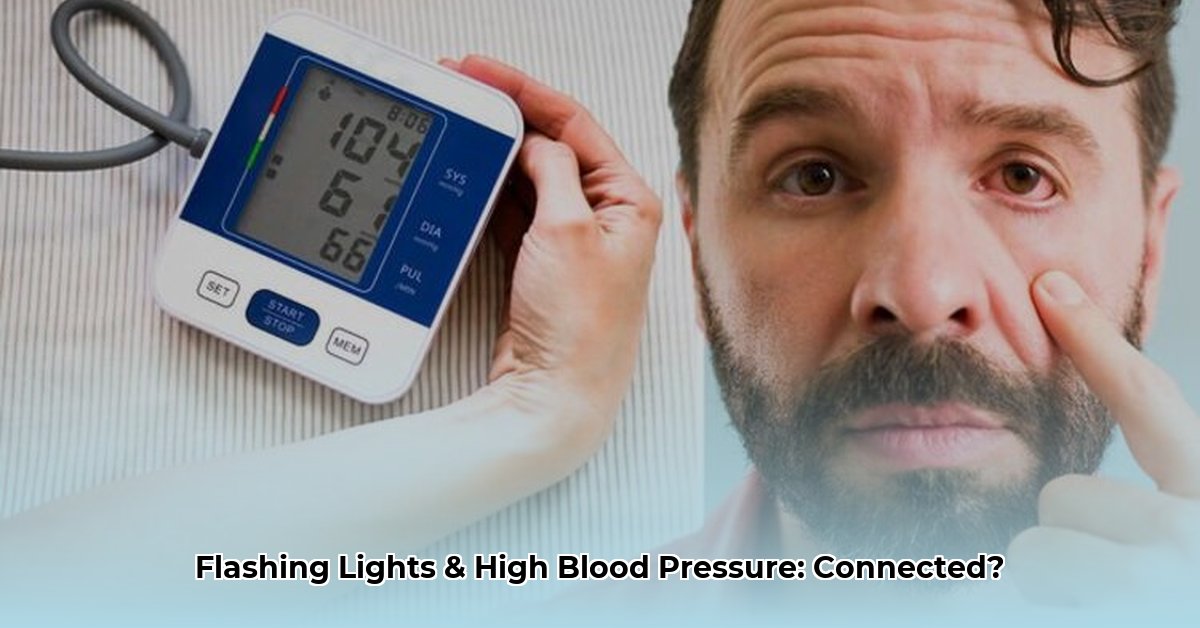The Surprising Link Between Blood Pressure and Eye Flashes
Can high blood pressure cause flashing lights in your eyes? Not directly, in most cases. While it might seem like a logical connection, high blood pressure itself rarely triggers those sudden bursts of light. However, it can play a role in worsening existing eye problems that might lead to flashes. Think of it this way: high blood pressure isn’t the lightning itself, but it could be the storm brewing in the background, creating conditions that make lightning more likely.
Floaters vs. Flashes: Understanding the Difference
It’s easy to confuse floaters and flashes. Floaters are those tiny specks, strings, or cobweb-like shapes that drift across your vision. They’re usually harmless and often caused by age-related changes in the vitreous, the jelly-like substance inside your eye. Flashes, on the other hand, are brief bursts of light, like sparks or lightning streaks. They often indicate something happening with the retina, and while they can sometimes be benign, they warrant a closer look by an eye doctor to rule out any serious issues.
Here’s a quick guide to help you tell them apart:
| Feature | Floaters | Flashes |
|---|---|---|
| Appearance | Spots, strings, cobwebs | Sparks, lightning streaks, shimmering lights |
| Movement | Drift slowly across your visual field | Appear suddenly and briefly |
| Typical Cause | Age-related vitreous changes | Retinal stimulation, Posterior Vitreous Detachment (PVD), migraines |
| Significance | Mostly harmless, but sudden onset or a significant increase warrants a check-up | Requires prompt medical attention |
How High Blood Pressure Affects Your Eyes
High blood pressure, especially over time, can damage the delicate blood vessels in your retina, the light-sensitive tissue at the back of your eye responsible for capturing light. This damage is known as hypertensive retinopathy. While hypertensive retinopathy itself doesn’t typically cause flashing lights, it can create a less-than-ideal environment in the eye, making it more susceptible to other conditions that can cause flashes, such as retinal tears or detachments. Current research suggests that the vascular changes associated with hypertensive retinopathy might indirectly contribute to the development or worsening of conditions that may trigger flashes.
Other Causes of Flashing Lights
Besides a potential indirect link with high blood pressure, several other factors can cause flashing lights:
-
Posterior Vitreous Detachment (PVD): This common age-related condition occurs when the vitreous gel shrinks and pulls away from the retina. The pulling can stimulate the retina, causing flashes. While PVD is usually harmless, it’s important to get it checked to rule out any retinal tears, which can occur if the vitreous pulls too hard on the retina.
-
Retinal Tears or Detachment: This is a serious eye emergency requiring immediate attention. A retinal tear is a break in the retina, while a detachment occurs when the retina pulls away from its underlying support tissue. Both can cause flashes, often accompanied by a sudden increase in floaters or a shadow or curtain-like effect in your vision.
-
Ocular Migraines: These migraines can cause temporary visual disturbances, including flashing lights, zigzag patterns, or even temporary vision loss, even without a headache. The exact cause of ocular migraines isn’t fully understood, but they are thought to be related to changes in blood flow to the brain.
-
Other Less Common Causes: Less frequently, flashing lights can be caused by eye infections, inflammation within the eye, certain medications, or trauma to the head. Ongoing research continues to investigate the various factors that can contribute to flashing lights and other visual disturbances.
What to Do If You Experience Flashing Lights: A Step-by-Step Guide
If you experience flashing lights, don’t wait to see if they disappear. Prompt action is crucial, especially with conditions like retinal detachment.
-
Seek Immediate Medical Attention: Contact an ophthalmologist or go to the emergency room right away. Time is of the essence, especially if a retinal tear or detachment is suspected.
-
Describe Your Symptoms in Detail: Be prepared to tell your doctor about the frequency, appearance, and duration of the flashes. Also, mention any other symptoms you’re experiencing, such as floaters, blurred vision, or eye pain.
-
Follow Your Doctor’s Instructions: Your doctor may recommend a dilated eye exam or other diagnostic tests to determine the cause of the flashes. Adhere to their treatment plan carefully.
Choosing the Right Eye Doctor: Optometrist vs. Ophthalmologist
Knowing which eye specialist to see – an optometrist or an ophthalmologist – can be confusing. An optometrist (OD) is your primary eye care provider. They perform routine eye exams, prescribe glasses and contacts, and diagnose and manage common eye conditions. An ophthalmologist (MD) is a medical doctor specializing in eye diseases, surgery, and more complex eye conditions.
For flashing lights, it’s recommended to see an ophthalmologist directly, or go to the emergency room, due to the potential seriousness of the underlying cause. They have the specialized training and equipment needed to diagnose retinal conditions and can initiate treatment quickly if necessary. Your optometrist can be a valuable resource for routine eye care and monitoring, but for flashes, seeing an ophthalmologist immediately is crucial.
Conclusion: Protecting Your Vision
While high blood pressure itself probably doesn’t directly cause flashing lights, it can contribute to eye problems that do. Regular eye exams, especially if you have high blood pressure, are vital for early detection and management of any potential issues. Don’t ignore any sudden changes in your vision, especially flashing lights. Prompt medical attention can help protect your precious eyesight.
Disclaimer: This article is for informational purposes only and does not substitute professional medical advice. Consult with a qualified healthcare provider for any health concerns or before making any decisions related to your health or treatment.
- Photos of Hydroelectricity Capture the Power of Water - January 21, 2026
- Fun Facts About Hydroelectric Power Unveiling Waters Powerful Secrets - January 20, 2026
- Fun Facts About Hydro Energy Revealing Waters Hidden Wonders - January 19, 2026















